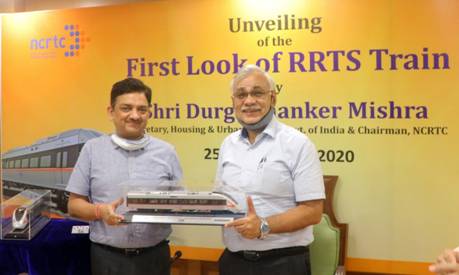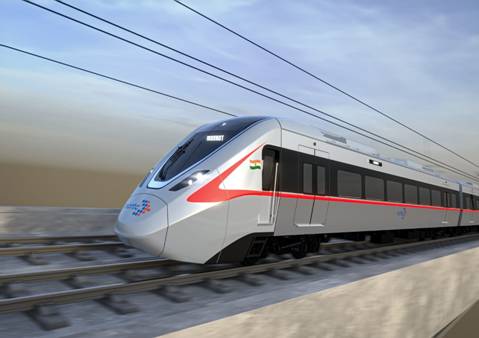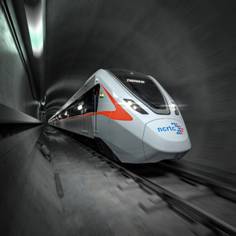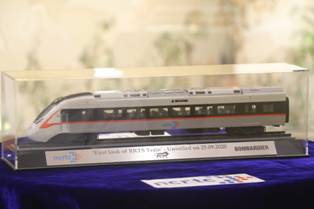Ministry of Housing & Urban Affairs
First Look of India’s First RRTS Train Unveiled
Aligned With Prime Minister’s ‘Make in India’ Policy: Durga Shanker Mishra
Entire Rolling Stock to be Manufactured at a Gujarat Plant
Sustainable and Energy Efficient Green Train Design
Delhi-Ghaziabad-Meerut RRTS Corridora Prioritised Corridor
Travel Time from Delhi to Meerut to Reduce by 1/3rd
प्रविष्टि तिथि:
25 SEP 2020 5:58PM by PIB Delhi
Infrastructure is one of the five pillars of AtmaNirbhar Bharat envisioned by our Hon’ble Prime Minister and it is a matter of great pride that these high-speed, high-frequency commuter trains for RRTS are entirely being manufactured under the government’s ‘Make in India’ policy, said Shri DurgaShanker Mishra, Secretary, MoHUA and Chairman, National Capital Region Transport Corporation (NCRTC).Unveiling the first look of India’s first RRTS train today, MoHUA Secretary said that the environment friendly, energy efficient trains will improve the quality of life in and around NCR by accelerating economic growth, creating economic opportunities and at the same time reducing air pollution, carbon footprint, congestion, and accidents. Shri Vinay Kumar Singh, Managing Director, NCRTC, all the members of Board of Directors of NCRTC and other senior officials of MoHUA, NCRTC and Bombardier India were also present at the event.

The state-of-the-art RRTS rolling stock will be first of its kind in India with a design speed of 180 kmph. With radiating stainless steel outer body, these aerodynamic RRTS trains will be lightweight and fully air-conditioned. Each car will have six automatic plug-in type wide doors, three on each side (Business Class will have four such doors, two on each side) for ease of access and exit. The RRTS trains will have transverse 2x2 seating with adequate legroom, optimized aisle width with grab handles and grab poles for a comfortable journey for standing passengers, overhead luggage rack, mobile/laptop charging sockets and on board Wi-Fi among other commuter-centric features. New Delhi’s iconic Lotus Temple is an epitome of sustainability as its design allows flow of natural sources of light and air circulation. On the similar lines, RRTS rolling stock will have lighting and temperature control systems to enhance the passenger experience with less energy consumption. Equipped with modern amenities, the RRTS rolling stock will be a unique amalgamation of new-age technology and India’s rich heritage.

Deliberating on the benefits of project, Shri Vinay Kumar Singh, Managing Director, NCRTC, said, “The rolling stock of India’s first RRTS has been designed with a vision to fulfil the aspirations of the New India. RRTS rolling stock will be energy-efficient with about 30% regeneration during braking. NCRTC has awarded the rolling stock work with an integrated long term comprehensive maintenance by the manufacturer, thus leveraging the benefits of life cycle costing. I am confident that RRTS will prove to be transport backbone for the people of NCR and will define a new benchmark in the transport sector enabling the overall growth of the region”.


The prototype is scheduled to roll off the production line in 2022 and will be put into public use after extensive trials. NCRTC will procure 30 train sets of 6 cars each for operating regional rail services on the entire corridor and 10 train sets of 3 cars each for operating local transit services in Meerut. The entire rolling stock for Delhi-Ghaziabad-Meerut RRTS corridor will be manufactured at Bombardier’s Savli plant in Gujarat.
The Delhi-Ghaziabad-Meerut RRTS corridor is one of the three prioritised RRTS corridor being implemented in phase-1. The 82 km long Delhi–Ghaziabad–Meerut Corridor is the first RRTS corridor being implemented in India. The corridor will bring down the travel time between Delhi to Meerut by around 1/3rd. The commute time from Delhi to Meerut will be reduced to less than an hour from 3-4 hours by road at present. Civil construction work on about 50-km long section between Sahibabad and Shatabdi Nagar, Meerut is in full swing including the construction of four stations - Ghaziabad, Sahibabad, Guldhar and Duhai. The priority section of the corridor is targeted to be commissioned in 2023, while the entire corridor will be commissioned in 2025. The other two Phase-I RRTS corridors are Delhi-Gurugram-SNB and Delhi-Panipat. Pre-construction activities are in full swing for Delhi-Gurugram-SNB corridor and its DPR is under active consideration of the Government of India for sanction. The DPR of the Delhi to Panipat RRTS corridor is also under active consideration of the respective State Governments for approval.

Features for Passengers
• RRTS train coaches will have transverse 2x2 seats.
• Optimized aisle width with grab handles and rails for a comfortable journey for standing passengers, overhead luggage rack, mobile/laptop charging sockets, adequate leg room and on board Wi-Fi.
• Double glazed, tempered large safety glass windows that offer passengers a panoramic view of the outside
• Equipped with public announcement & display system, dynamic route map display, infotainment display, along with emergency communication facilities. The train is designed for modern visual and audio announcements which orient passenger with information about next stop, final destination, etc.
• Automatic plug-in type wide doors reducing air-friction and noise.
• CCTV, fire & smoke detector, fire extinguisher and door indicator.
• Universally accessible- Dedicated wheelchair space located near to the train doorway for easy access.
• Proven light weight and compact propulsion system with high reliability and performance requirements.
• Innovative Train Control Monitoring System (TCMS) technology, as well as its predictive and condition-based monitoring features, which will enhance the fleet’s performance by providing extensive train-to-ground diagnostics.
• Designed keeping in mind high-acceleration and high-deceleration that the train needs to undergo given the maximum operational speed of 160kmph and stations at every 5-10km.
• Trains would run under Automatic Train Operation (ATO) to provide smooth ride with precise stopping accuracy and will also save energy.
• These modern trains will have push buttons for selective opening of doors on need basis. This eliminates the requirement of opening all doors at every station, thus leading to energy saving.
• RRTS trains will also have business class (one coach per train) with spacious, comfortable and reclining seats which will be accessible through a special lounge at the platform-level.
• A food automatic vending machine will be installed in the business coach.
• One coach in every train will be reserved for women passengers as well.
• Given the high-speed train operations, all RRTS stations will have Platform Screen Doors (PSDs) for safety of the passengers. The train doors will be integrated with PSDs.
About NCRTC
NCRTC is a joint venture of the Government of India (50%) and State Governments of Haryana (12.5%), NCT Delhi (12.5%), Uttar Pradesh (12.5%) and Rajasthan (12.5%). It is mandated to design, construct, finance, operate and maintain RRTS in NCR and works under the administrative control of Ministry of Housing & Urban Affairs, GOI. NCRTC is mandated to implement India’s first RRTS in NCR.
For more details visit: www.ncrtc.in
****
RJ/NG
(रिलीज़ आईडी: 1659084)
आगंतुक पटल : 2220